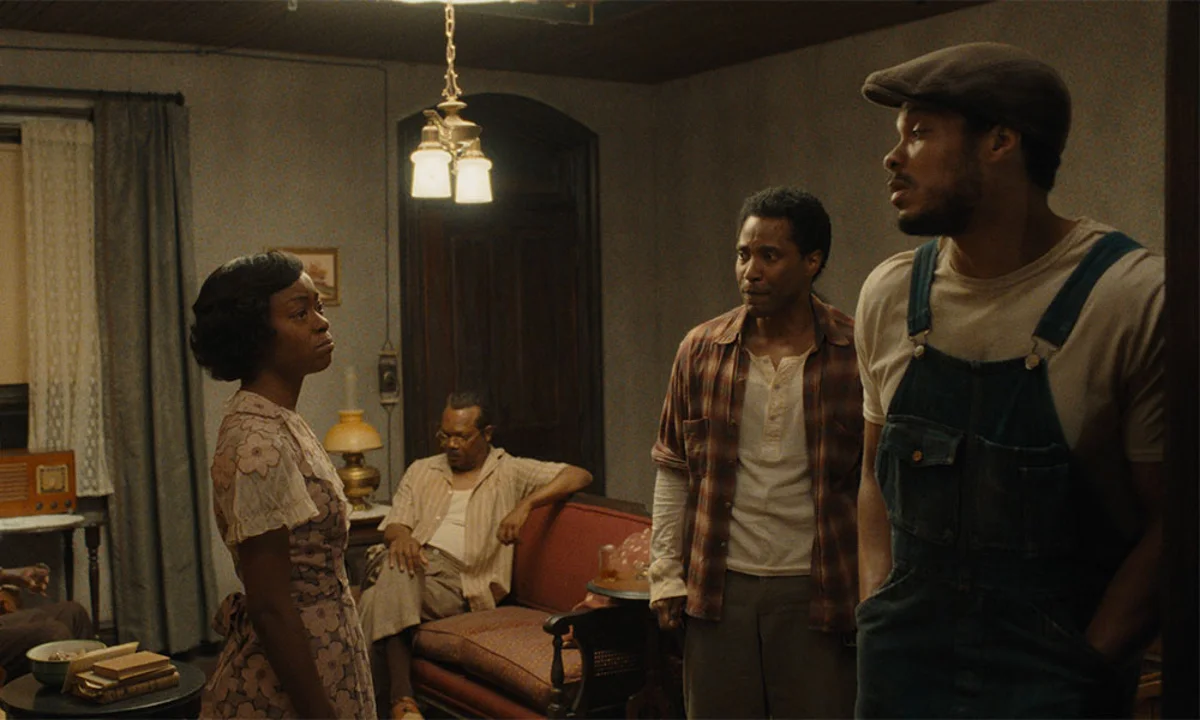
It is a tad ironic that a movie about family is also a family affair behind the scenes. The Piano Lesson is directed by the son of Denzel Washington, Malcolm Washington in his feature length debut. Malcolm directs his brother John David as one of the film’s leads and their father has helped to produce. Together, they bring a famous August Wilson play to the big screen.
The Piano Lesson introduces us to the Charles family, brother and sister Boy Willie (John David Washington) and Bernice (Danielle Deadwyler) and their uncle Doaker (Samuel L. Jackson). The family has roots in Mississippi, but Doaker and Bernice now live in 1936 Pittsburgh with Bernice’s daughter Maretha (Skylar Aleece Smith). In their house is an old family heirloom, a piano, which is decorated with designs carved by an enslaved ancestor. Boy Willie has come to Pittsburgh to convince his sister to sell the piano so that he can buy land that is for sale from the recently deceased descendant of the man who owned their family during slavery, James Sutter (Jay Peterson). Bernice refuses to however, leading the family to confront pain from the past, recent and old.
The conflict at the center of The Piano Lesson is represented by each sibling and their stance on the sale of the family piano. Bernice represents that side of sentimentality while Boy Willie is pushing his sister toward progress for the next generation of their family. The question their battle raises is, how do you best honor your family? By preserving what was or advancing toward a better future in honor of their sacrifices? Which holds more weight, the future or the past? It is an ideological debate that has been around for ages and has no easy answer, which the film doesn’t attempt to offer either. Instead, Bernice and Boy Willie both state their cases, arguing for preserving what was and for taking what was and building upon it toward something greater which elevates the family by building a successful future just as much as preserving their memory does. Bernice isn’t just holding onto the past that the piano represents, but her past loss of her husband Crawley. Each prevents her from moving on with her life, though one seems more permissible than the other. Watching the brother and sister passionately debate is compelling to watch and the back and forth is sure to get audiences thinking through their own preferences, creating an investment in both the theme itself and which side ultimately wins out as the story concludes.
Washington and Deadwyler both perform well and display a believable chemistry as a brother and sister with past baggage that has yet to be adequately worked through. Deadwyler in particular is an emotional powerhouse and presents Bernice as a sympathetic character who is strong yet vulnerable underneath the surface. Washington pulls off a balance of obnoxious and slightly irresponsible, but with a determination to do his father proud and an under appreciated cunning to achieve his goal of land ownership. Boy Willie is a character that could easily come across as grating or hard to root for due to his obvious faults that mostly overshadow his good qualities, but Washington is able to highlight both in his performance to a level where the character comes across as complicated as intended.
Bernice and Doaker’s home is haunted by the ghost of Sutter, the recently deceased grandson of the man who owned the Charles family, but apart from adding a horror element to the film, his haunting spirit serves as a metaphor for how the family is haunted by their past trauma surrounding the Sutter family, and by extension the piano, as a whole. He is ever-lurking and can pop up in moments of stress and worry as trauma often does. This metaphorical exploration works in tandem with the central conflict of holding onto the past versus moving toward the future as described above, which makes The Piano Lesson’s third act all the more frustrating. In the film’s climactic scene, the metaphorical demons surrounding the Charles family turn more literal as the battle for the piano and against the spirit of Sutter comes to a head. While tense and bombastic, the sudden shift toward the presence of actual spirits changes the tone of the film too drastically. What had been a drama about family conflict and generational trauma becomes a paranormal horror film out of nowhere and distracts from the previous groundedness. It doesn’t completely torpedo the film, but change it substantially.
The Piano Lesson is a quality adaptation from the stage featuring quality cinematography that mostly succeeds in breaking up the fact that most of the story occurs in one room of the house, preventing it from feeling too much like a stage play adapted to screen. Danielle Deadwyler and John David Washington lead a good cast with Deadwyler’s performance in particular standing out as a powerhouse. The film is mostly a quality drama about trauma and how to face it head on until a third act that takes a turn for the dramatic to its slight detriment. Still, it’s a decent watch with some good substantive elements.
Image: Netflix

